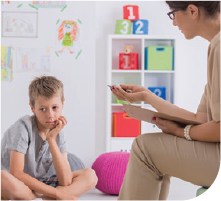Does my child or I have ADHD?
There is no single test to diagnose ADHD. Common problems like sleep disorders, anxiety, depression, and certain types of learning disabilities can look very similar to ADHD.1
Your health care professional will ask parents, teachers, and others who care for your child in different settings to help in diagnosing ADHD.1,2
Children with ADHD show signs of
inattention
and
hyperactivity
/
impulsivity
in certain ways.
Table 1 lists some signs of ADHD.
Inattention
- Often has a hard time paying attention, daydreams
- Often does not seem to listen
- Is easily distracted from work or play
- Often does not seem to care about details, makes careless mistakes
- Frequently does not follow through on instructions or finish tasks
- Is disorganized
- Frequently loses a lot of important things
- Often forgets things
- Frequently avoids doing things that require ongoing mental effort
Hyperactivity/Impulsivity
- Is in constant motion, as if "driven by a motor"
- Cannot stay seated
- Frequently squirms and fidgets
- Talks too much
- Often runs, jumps, and climbs when this is not permitted
- Cannot play quietly
- Frequently acts and speaks without thinking
- May run into the street without looking for traffic first
- Frequently has trouble taking turns
- Cannot wait for things
- Often calls out answers before the question is complete
- Frequently interrupts others
A health care provider will look for the signs in Table 1 and follow the criteria below to confirm that your child has ADHD. Evaluation of the signs and symptoms listed below is one part of the overall process used to diagnose ADHD.1,2
- Centers for Disease Control and Prevention (CDC). Symptoms and Diagnosis of ADHD. 2020. Available at https://www.cdc.gov/ncbddd/adhd/diagnosis.html. Accessed June 7, 2020.
- American Psychiatric Association: Diagnostic and Statistical Manual of Mental Disorders, 5th edition. Arlington, VA: American Psychiatric Association; 2013.
- Healthy Children. Diagnosing ADHD in Children: Guidelines & Information for Parents. 2017. Available at https://www.healthychildren.org/English/health-issues/conditions/adhd/Pages/Diagnosing-ADHD-in-Children-Guidelines-Information-for-Parents.aspx. Accessed June 7, 2020.
- Medicine Net. Inattention: Symptoms & Signs. Available at https://www.medicinenet.com/inattention/symptoms.htm. Accessed June 7, 2020.
- Medline Plus. Hyperactivity. Available at https://medlineplus.gov/ency/article/003256.htm.
- Medicine Net. Medical Definition of Impulsivity. Available at https://www.medicinenet.com/script/main/art.asp?articlekey=22330. Accessed June 7, 2020.
- Medicine Net. Medical Definition of Symptom. Available at https://www.medicinenet.com/script/main/art.asp?articlekey=5610. Accessed June 7, 2020.
- Children and Adults with Attention-Deficit/Hyperactivity Disorder (CHADD). Diagnosing ADHD in Adults. 2020. Available at https://chadd.org/for-adults/diagnosis-of-adhd-in-adults/. Accessed June 7, 2020.
- DuPaul GJ. Parent and teacher ratings of ADHD symptoms: Psychometric properties in a community-based sample. J Clin Child Psychol. 1991; 20:242.
- DuPaul GJ, Power TJ, Anastopoulos AD, Reid R. ADHD Rating Scale-IV: Checklists, Norms, and Clinical Interpretation. New York: The Guilford Press; 1998.
- DuPaul GJ, Power TJ, Anastopoulos AD, Reid R. ADHD Rating Scale-V: Checklists, Norms, and Clinical Interpretation. New York: The Guilford Press; 2016.
- Achenbach TM. Manual for the Child Behavior Checklist. University of Vermont: Department of Psychiatry; Burlington, 1991.
- Achenbach TM. Manual for the Teachers Report Form. University of Vermont: Department of Psychiatry; Burlington, 1991.
- Conners CK. Conners 3rd Edition. Toronto: Multi-Health Systems, Inc; 2008.
- Adult ADHD-RS-IV with Adult Prompts. Available at https://www.qandadhd.com/Content/pdf/ADHD-RS-IV_Tear-Pad-with-Adult-Prompts.pdf. Accessed June 7, 2020.
- Attention Deficit Disorder Association. Adult ADHD Self-Report Scale (ASRS-v1.1) Symptom Checklist. Available at https://add.org/wp-content/uploads/2015/03/adhd-questionnaire-ASRS111.pdf. Accessed June 7, 2020.






